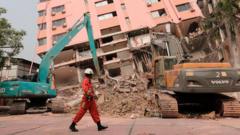In Latakia, amidst recent regime changes, fear grips the Alawite population, who once benefited from Assad's rule. Armed group Hayat Tahrir al-Sham (HTS) enforces new law, yet many citizens grapple with the consequences of their loyalty to the former regime.
The New Reality in Latakia: Alawite Anxiety Amidst Changing Powers

The New Reality in Latakia: Alawite Anxiety Amidst Changing Powers
As HTS establishes control in Latakia, the Alawite community navigates a complex landscape filled with fear and uncertainty over their past affiliations.
Noor stands trembling in the courtyard, an embodiment of fear amidst the chaotic reality of post-Assad Latakia. The armed men of Hayat Tahrir al-Sham (HTS) now patrol her neighborhood, imposing the new order following the abrupt departure of Assad's soldiers. Noor recounts her harrowing experience of having her family home forcibly taken by armed assailants — a violation that represents a new chapter of terror for Latakia's Alawite community, who traditionally held power within the regime.
Latakia, a coastal city enriched by its Alawite majority, has become a hotspot for rebel groups vying for control after Assad's regime crumbled. Noor's fears are amplified by a shared anxiety among Alawites, many of whom avoid venturing outside. The stigma of supporting the discarded regime binds them together in their worries of potential retribution from the new rulers, who were once adversaries.
The transition is stark; once an oppressive military intelligence headquarters, HTS’s security station is now where Noor and others muster courage to voice their grievances. Here, a steady trickle of people arrives, sharing tales of violence perpetrated by groups seizing homes — a grim reminder of the fragility of order in this unexpected new arrangement.
Witnessing the bruised and battered man reporting another familial assault underscores the chaotic lawlessness pervading Latakia since HTS's ascendance. As HTS attempts to maintain stability, it also grapples with complaints from those facing the wrath of rival factions and opportunistic criminals.
The promise to protect all sects seems at odds with lingering societal fissures that Assad’s regime exacerbated. Committed to their pledge, HTS commanders like Abu Ayoub attempt to reassure terrified residents, yet their former role as insurgents lingers in public perception, complicating their newfound authority. Amidst this, placates from HTS declare their intentions to dismantle illegal occupations and restore order.
However, skepticism from the Alawite populace remains palpable as they navigate a precarious existence filled with tension and fear. The old regime's vestiges are not easily erased; the memories of oppression run deep and the prospect of another reckoning looms large.
As Noor leaves her home, grappling with the remnants of her past life and uncertain future, she expresses a longing for a sense of safety — something elusive in a landscape where change often breeds fear more than hope. Her story encapsulates the ongoing struggle of a community seeking stability in a nation marred by chaos and division, one that may not come easily. In Latakia, old nightmares may have ended, but new ones quietly begin.




















